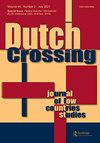‘I, Who Used to Serve as Jupiter’s Lightning on Earth’: Geeraerdt Brandt’s De Veinzende Torquatus (1645), Providentially Assigned Stadtholders and the Politics of Rational Deception
IF 0.4
3区 历史学
Q1 HISTORY
Dutch Crossing-Journal of Low Countries Studies
Pub Date : 2019-05-08
DOI:10.1080/03096564.2019.1615761
引用次数: 0
Abstract
ABSTRACT This article aims to show that Geeraerdt Brandt’s popular revenge tragedy De veinzende Torquatus (1645) engages with the political debates concerning the rightful succession of monarchs based on primogeniture, and – be it in a grotesque, even parodic way – the Calvinistic belief that the Dutch stadtholders were God’s providential instruments, assigned to guide His chosen people. Subsequently, I show that the play offers a confrontation between two conflicting conceptions of power. The play’s eponymous protagonist holds what I call an intellectual (idealistic) conception of power, in which man's rational faculty, including his capacity for rational deception, is all-decisive. This vision, though, clashes with the more physical (materialistic) conceptualization of power which Torquatus’s antagonist Noron upholds.《我,曾经是木星在地球上的闪电》:勃兰特的《德·维因岑德·托克图斯》(1645),《天意分配的税收人与理性欺骗的政治》
本文旨在展示勃兰特(Geeraerdt Brandt)的复仇悲剧De veinzende Torquatus(1645)与基于长子继承制的君主合法继承的政治辩论,以及加尔文主义的信仰,即荷兰执政官是上帝的天命工具,被指定来指导他的选民。随后,我指出,该剧提供了两种相互冲突的权力观念之间的对抗。该剧的同名主人公持有我称之为智力(理想主义)的权力观念,在这种观念中,人的理性能力,包括理性欺骗的能力,是决定性的。然而,这一观点与托尔奎图斯的对手诺伦所坚持的更物质(唯物主义)的权力概念相冲突。
本文章由计算机程序翻译,如有差异,请以英文原文为准。
求助全文
约1分钟内获得全文
求助全文

 求助内容:
求助内容: 应助结果提醒方式:
应助结果提醒方式:


